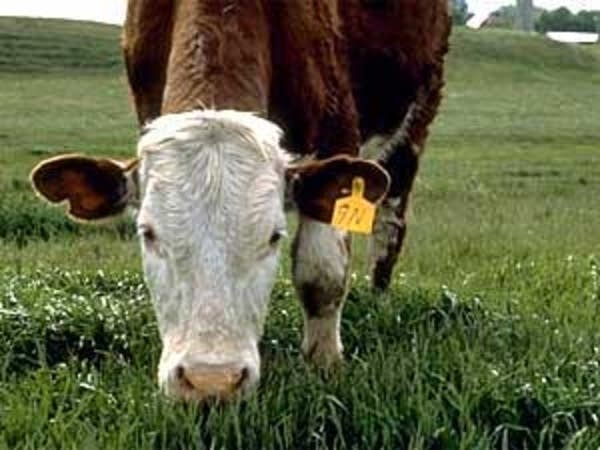New case of bovine TB could downgrade Minn.'s status

Another case of bovine tuberculosis in northern Minnesota will lead to a downgrade in the state's TB status.
This is the fourth infected cattle herd since last fall, and the 11th since the disease was first found in 2005. All the cases have been found in Beltrami and Roseau counties.
Minnesota State Veterinarian Bill Hartmann says more cattle will need to be tested.
"Because of this fourth infected herd, Minnesota's status will change to modified accredited. That will impact the cattle industry statewide," says Hartman. "How that will impact us to start with will be the interstate movement of cattle."
Create a More Connected Minnesota
MPR News is your trusted resource for the news you need. With your support, MPR News brings accessible, courageous journalism and authentic conversation to everyone - free of paywalls and barriers. Your gift makes a difference.
Joe Martin, assistant commissioner of the Minnesota Department of Agriculture, says beef herds will need to be tested before any animals can move across state lines.
"Just for rough estimates, we probably have 200,000 cattle moving across our borders right now and we estimate a $10 an animal test. Costs start adding up quickly," Martin said.
State officials are talking with the U.S. Agriculture Department about a testing program for dairy cattle.
The state is also considering splitting the state into two zones to ease the TB restrictions on farmers. That process could take up to a year.
Besides following the U.S. Department of Agriculture's regulations, many producers fear neighboring states will also set up stricter guidelines.
"That's the big concern, because a lot of the cattle in Minnesota go to other states to feed," Pyfferoen said. "They're going to issue their own import requirements and ... we have to live with that."
It would take at least four years for Minnesota to get back to the highest status-level, TB-Free, Hartmann said.
Officials recently completed statewide surveillance by testing 1,550 herds and are continuing surveillance of herds within 10 miles of the infected area. The Minnesota Department of Natural Resources has also been thinning deer herds in the core area to prevent the disease's spread.
That potential has some producers in northwestern Minnesota wondering what the future might hold. Many fear they could be the next to test positive for the disease, said Darrin Arveson, who raises about 45 beef cattle in Pennington County.
"It's scary," said Arveson, whose farm is located just 15 miles from one of the farms that tested positive.
With high gas prices and the rising cost of land already taking their toll, Arveson said dealing with bovine TB hurts his bottom line even more. Besides paying for testing, farmers are encouraged to build fences for their feed to keep deer out.
"People are just going to have to get out of it," he said. "I was hoping that one day my boys would be able to take over, but I don't know."
(The Associated Press contributed to this report)
